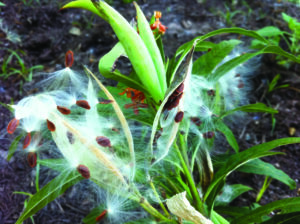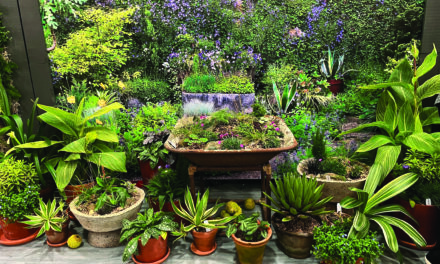
On the success of its Seed Stewards for Monarchs program harvesting milkweed seed, Environmental Concern is extending its seed saving efforts to more native species with the Eastern Shore Seed Stewards initiative. (Photo courtesy Ecological Landscape Alliance)
The Talbot County-based Environmental Concern recently announced the launch of the Eastern Shore Seed Stewards initiative to teach gardeners and plant enthusiasts how to collect seed in their own backyard gardens.
The non-profit’s Native Plant Nursery, operating in St. Michaels since 1972, has learned from experience that it takes more than a village of experienced native plant specialists to collect enough seed to grow more than 110 species of native plants.
The initiative puts out the call to identify native species on their property and collect the plant’s seeds this fall.
“This is our opportunity to connect with the community on a virtual basis,” said Suzanne Pittenger-Slear, Environmental Concern president. “It also adds another component to being in the garden.”
Environmental Concern’s annual native seed harvesting process starts in the summer and continues through the fall.
The nursery specialists collect seeds from herbaceous plants, shrubs, and trees planted on Environmental Concern’s campus and harvest in their backyard — a practice that generated the idea for the seed stewards initiative.
In 2018, Environmental Concern founded the Seed Stewards for Monarchs program.
The increased demand for milkweed plants to reverse the 90-percent decrease in the Monarch population, resulted in a milkweed seed shortage.
The Monarch butterfly is a “Near Threatened” species due to the dramatic loss of Monarch habitat.
The Seed Stewards for Monarchs program accomplished two important goals: increasing the Monarch butterfly’s critical milkweed habitat and increasing seed inventory for Environmental Concern’s milkweed crops.
More than 250 volunteers are currently participating in the milkweed program.
The Eastern Shore Seed Stewards initiative is an extension of the Seed Stewards for Monarchs program, expanding to more native plants than milkweed.
Through virtual presentations, Environmental Concern educates participants about growing native plants, plant identification, and native plant seed harvesting.
“This is a process that’s different for every plant.” Pittenger-Slear said. “We want them to understand from seed to maturity to seed collection again.”
From the seeds they collect, Seed Stewards are asked to donate a percentage of their seeds to Environmental Concern as well as propagate and grow some in their gardens.
Environmental Concern benefits from the generous seed donations from the Seed Stewards, and the Seed Stewards receive discounts on plants, seed harvesting education programs, and invitations to appreciation events.
“This activity is appropriate for all ages – from 4 to 94. Families, garden clubs, 4-H groups, neighbors, church groups, and all Eastern Shore communities and organizations are welcome to join the program,” said Pittenger-Slear. “Your participation will increase habitat for all native creatures that need the food, cover, and protection that the native plants provide on shorelines and in rain gardens, pollinator gardens, and wetlands.”
Seed Stewards communicate by email, virtual education sessions, and social media. Seed Stewards also communicate with each other to share helpful suggestions and tips for successful seed harvesting. Visit Environmental Concern’s website, wetland.org, to sign up for the Eastern Shore Seed Stewards program, or contact reception@wetland.org for more information. A donation of $10 is requested to support the program.
While its typical plant sale events were halted due to the coronavirus pandemic, Environmental Concern’s nursery is bursting with colorful native species, Pittenger-Slear said.
Plant availability is updated bi-weekly and is posted at https://wetland.org/retail/.




